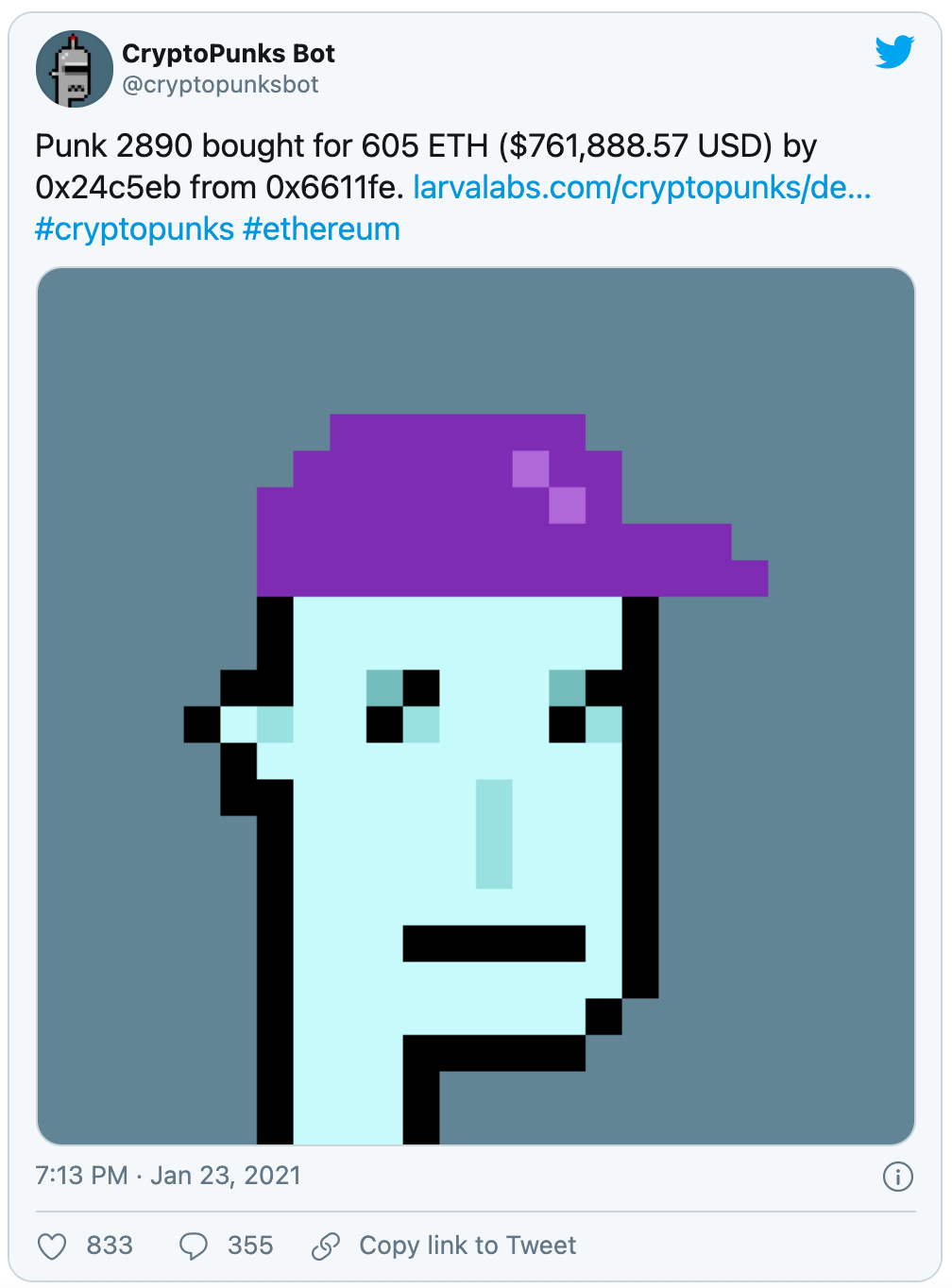One thought for the week 💭
NFTs will be the property rights of the Metaverse
[950 words - 3 minute read]
On Monday Mark Cuban released 10 limited-edition animations of himself dancing in the form of non-fungible tokens (NFTs). All sold out within hours. Meanwhile, last weekend, a rare alien CryptoPunk - the predecessor of CryptoKitties - sold for 605 ETH, or >$750,000 at the time of the sale.
These events remind me of a seminal post by Chris Dixon - The next big thing will start out looking like a toy.
Currently, NFTs seem disproportionately focussed on use cases like trading green cats with horns and owning one-of-a-kind trump memes. Yet, this same technology will some day underpin trillions of dollars in economic value.
What are NFTs?
NFTs stand for non-fungible tokens and refer to cryptographic assets that signify ownership of unique things, such as digital art or a one-of-a-kind in-game asset. The key feature of NFTs is that they are not interchangeable (non-fungible). This uniqueness creates scarcity.
Similar to physical goods like limited edition sneakers, these digital items are distinguishable from one another by a serial number. The “serial number” for NFTs is their token ID, which is stored on the blockchain. The data that lies within each NFT token is unique, thus making each NFT token in existence completely exclusive.
Why does the Metaverse need NFTs?
One of the essential features of the Metaverse is the ability to transfer your self (avatar) and all of your owned digital assets from location to location.
This seamless transferability is a fundamental characteristic of the physical economy. Imagine if IRL, your employer paid you in a currency that could only be used within their own store. If all the clothes and goods that you owned could only be worn or used in certain venues. If 100% of the economic decisions that decided the value of your accumulated wealth were made by a few private corporations. In this scenario, the economic value denominating all goods, services and money would be orders of magnitude lower than it is today.
Yet, this is the extant situation in today’s virtual worlds. It is estimated that anywhere between $30bn and $50bn is spent on virtual goods annually. All of these goods exist in siloed databases with wildly varied formatting and an inability to interact with anything beyond their existing world. This level of spend is incredible, given these items exist in heterogenous, centralised services that are owned by a single company, provide no ongoing cash flows, and offer no real ownership/control prospects.
However, there are limits to how much further this can grow. If we are to move to a true Metaverse, in which trillions of dollars is spent on digital assets, these issues must be resolved. In order to maximise the willingness of individuals to allocate serious time and capital to virtual environments, establishing trust in the persistence of the economic system is critical. Without this, people will not be incentivised to spend or to create on anywhere near the same scale that they do in the physical world.
NFTs offer the most elegant solutions to these problems.
They create strong digital property rights by offering a universal digital representation and ownership layer through which scarcity, uniqueness, and authenticity can be transparently managed.
How might this work in practice?
Individuals will buy a plot of land that becomes their home in the Metaverse. This would itself be a NFT. The value of that land would depend on a number of factors, such as its location and the investments in the surrounding infrastructure. However, the ability to truly and irrevocably own the virtual space via a NFT is what will create the economic incentives for the real-estate market to flourish. This is already happening on Decentraland.
People and brands will spend their time producing digital goods (clothes, buildings, artwork, furniture, technology infrastructure)…. they will then gain ownership of their creations as NFTs. They can then sell these items on - either in exchange for other NFTs or for cryptocurrency. ‘Counterfeit’ goods may be outlawed - or at least clearly highlighted - thereby strengthening the value of digital goods. Such a situation creates strong incentives for UGC creation - an essential feature of the Metaverse. This is already happening on The Sandbox.
At the centre of this all would be the avatar. This in itself would be a NFT. This avatar would be tied to an individual, enabling them to maintain their identity across virtual spaces. They could use an API to summon in any of the assets that they have built or bought or inherited. These could be used or traded in any location in the Metaverse. This individual, decentralised ownership and cross-world interoperability is the glue that will tie the economic system of the Metaverse together. NFTs are the core of all of this.
Current challenges
As with most areas of crypto, NFT technologies are still in their infancy. The leading technology currently is the ERC-721 standard on Ethereum which has a market cap of ~$540m.
However, it suffers several shortcomings:
Speed: In a world which operates at 60 FPS, taking minutes to update is not practical.
Fees: At times of high usage, Ethereum still suffers from crippling fees that destroy the user experience for most applications.
UX: The interfaces of decentralised apps are still hard to decipher for most people.
However, one only needs to look at the state of the internet in 1999 for hope. As adoption scales, so will the investment in infrastructure, and therefore, the technology’s efficacy.
A few musings
One day….
Virtual jobs will pay more than physical jobs in many countries. We have seen early evidence of this in Venezuela, where farming Runescape gold led to ‘farmers’ earning >10x the monthly income of an average Venezuelan doctor.
Stock market trading of Metaverse economy companies will be greater than the trading of physical economy companies.
Further reading
If you have ~1 hour, I would highly recommend reading these two excellent essays. Both have taught me a huge amount about this topic:
Packy McCormick - The Value Chain of the Open Metaverse
Piers Kicks - Into the Void: Where Crypto Meets Metaverse
News from this week 🗞
Gaming 🎮
Indian gaming platform Mobile Premier League raised $95m at a $945m valuation. This comes just five months after it secured $90 million as the two-and-a-half-year-old Bangalore-based esports and gaming platform looks to grow in international markets. The app, which has amassed more than 60 million users in India and 3.5 million users in Indonesia, also serves as a publishing platform for other gaming firms. MPL, which does not develop games of its own, hosts about 70 games across multiple sports on the app today. Link
Israeli in-game advertising platform Anzu.io gets $9 million for global expansion. Operating across console, PC, and mobile platforms, Anzu’s technology blends real-world ads into video games, esports tournaments and live streams. Clients include game publishers Ubisoft, Lion Castle, and Nacon and global brands Pepsico, Samsung and Vodafone. Link
Latitude, developer of the popular AI Dungeon game built on OpenAI’s GPT-3, has raised $3.3M in seed funding. The company’s platform accelerates game development from years to months for IP holders and allows for much smaller teams to build immersive game experiences, reducing costs from more than $100M to less than $100,000. Link
Nerd Street Gamers has raised $11.5 million to expand its digital esports platform. Even with the company’s esports training venues closed for the majority of the past year due to the pandemic, Nerd Street said it saw big growth thanks to its digital platform. It offers affordable competitive experiences like tournaments, camps, and coaching, and Nerd Street increased its membership by more than 218% since 2019. Link
Audio 🎧
Deepgram, a Y Combinator graduate building custom speech recognition models, announced that it raised $25 million in series B funding. Deepgram’s models pick up things like microphone noise profiles as well as background noise, audio encodings, transmission protocols, accents, valence (i.e., energy), sentiment, topics of conversation, rates of speech, product names, and languages. Moreover, they can increase speech recognition accuracy by 30% compared with industry baselines while speeding up transcription by 200 times, and while handling thousands of simultaneous audio streams. Link
English learning app ELSA lands $15 million Series B for international growth and the launch of its B2B platform. ELSA was designed to give users an accessible resource to help improve their pronunciation and confidence when speaking English. Other apps focused on English pronunciation include FluentU and Say It. One of ELSA’s main advantages is its proprietary voice recognition AI tech. Link
Aflorithmic, a two-year-old, London-based SaaS-based startup that makes hyper-personalised audio experiences using AI voice synthesis and voice cloning, has raised $1.3 million in seed funding. Link
AR/VR/MR 🕶
The Information reported that Apple is working on a MR headset with swappable headbands, more than a dozen cameras, eye-tracking tech and an eye-popping $3,000 price tag. It also published a drawing based on internal renders. Link
Video 📹
Kuaishou, a Chinese video app that's a fierce rival for Douyin, the Chinese version of TikTok, has completed a massive IPO in Hong Kong. The app -- which makes money through the sale of virtual goods, ads and online marketing, and e-commerce and games -- saw its shares open today at the equivalent of $43.60 each, a 194% jump from its IPO price of $14.80. That catapults its market cap to nearly $180 billion. Link
Class, a six-month-old startup that integrates exclusively with Zoom to offer a more customised classroom experience has raised $30 million in fresh funding. The company has now raised $46 million altogether. Link
BBC Maestro - an eLearning service offering tutorials with the likes of Gary Barlow, David Walliams and Marco Pierre White - has raised £2 million in a new funding round. Designed in partnership with BBC Studios, it allows users to be taught through a series of digital tutorials by experts, known as the Maestros. A one-off cost of £80 per course allows participants unlimited access via web browsers on mobile, tablet, laptop and desktop computers. Link
Cofenster, a Hamburg-based SaaS tool that enables automated video production from a smartphone, has closed a €1.5 million seed funding round. Cofenster is largely used in-house at enterprise companies. The app enables employees to produce high-quality corporate videos automatically, and in the company’s branding, via their own smartphones. Teams at Beiersdorf, Microsoft, Stada and Carlsberg are using it for internal communications, human resources and product communications. Link
Other 🤷♂️
Brightwheel, a startup that provides technology to preschools, said it’s valued at more than $600 million after a $55 million funding round. Brightwheel’s app is used by preschools, daycare centres and camps to communicate with parents. The software also processes billing and enables businesses to send photos and updates about children’s activities. The company’s valuation jumped from $115 million in 2018, according to PitchBook. Link
Mobile apps marketplace and games publisher AppLovin is acquiring Adjust, a Berlin, Germany-based startup that makes tools to measure the performance of apps, in a deal valued at close to $1 billion.Link
Interesting data from this week 📈
Zoom is now worth more than the top seven airlines combined.
Source: Visual Capitalist
Thank you for reading ✌️






